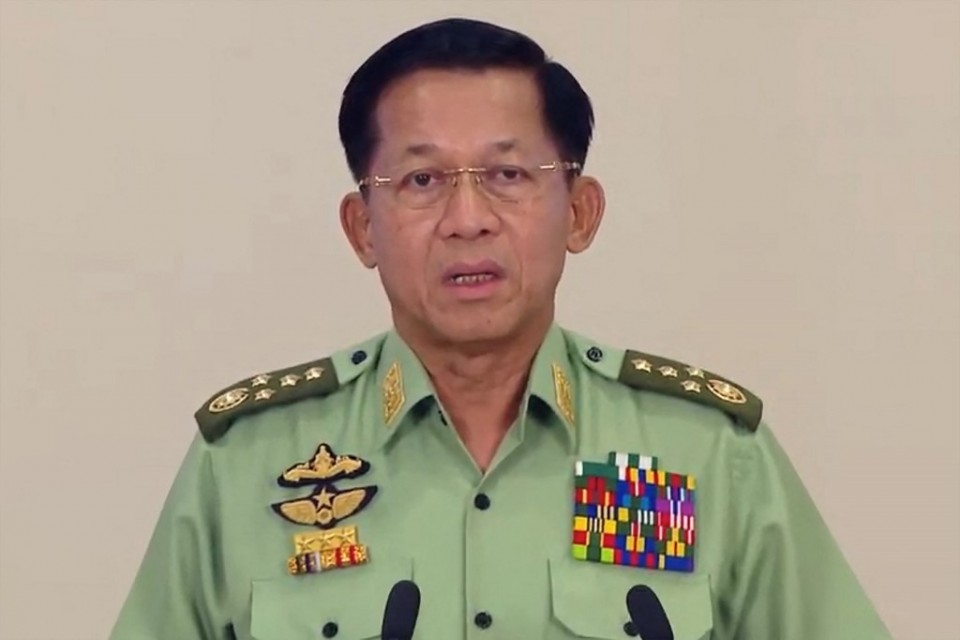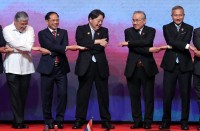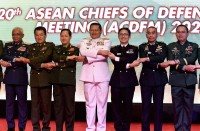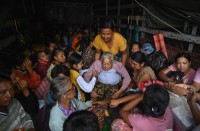
YANGON, Myanmar (AFP) — Myanmar’s army chief on Monday insisted military rule would be different this time, as martial law was declared across swathes of the country after massive protests against the new junta.
Orders covering parts of Yangon, Mandalay and other areas banned people from protesting or gathering in groups of more than five, and imposing an 8:00 pm to 4:00 am curfew.
New junta chief General Min Aung Hlaing, wearing a green military uniform, made his first televised speech since seizing power, insisting the putsch was justified by “voter fraud”.
He echoed previous military insistence that the power grab was in line with the constitution, but declared that this time things would be “different” from the army’s previous 49-year reign, which ended in 2011.
“After the tasks of the emergency period are completed, free and fair multi-party general elections will be held according to the constitution,” he said.
“The winning party will be transferred state duty according to democratic standards.”
The general said the country welcomed foreign investment and also announced lifting of coronavirus restrictions, including reopening schools and Buddhist pagodas.
Rohingya refugees who fled to Bangladesh during a 2017 crisis will continue to be repatriated to Rakhine state, he added.
– Mass rallies –
The junta has so far refrained from using deadly force against the demonstrations sweeping most of Myanmar, but with pressure building, riot police fired water cannon in an attempt to disperse thousands gathered in Naypyidaw on Monday.
The military last week detained civilian leader Aung San Suu Kyi and dozens of other members of her National League for Democracy party, ending a decade of partial civilian rule and triggering international condemnation.
In the face of an increasingly bold wave of defiance, state broadcaster MRTV in the afternoon warned that opposition to the junta was unlawful and signalled a potential crackdown.
“Action must be taken according to the law with effective steps against offences which disturb, prevent and destroy the state’s stability, public safety and the rule of law,” said a statement read by an announcer on the channel.
On Monday in Yangon, the nation’s commercial capital, dense crowds spilled onto the city’s main roads, immobilising traffic and dwarfing the previous day’s rally.
“Down with military dictatorship” and “release Daw Aung San Suu Kyi and arrested people”, protesters chanted, flashing the three-finger salute of “Hunger Games” fame that has come to symbolise their movement as car horns were honked in support.
Textile workers, civil servants and railway employees went on strike and hit the streets.
“This is a work day, but we aren’t going to work even if our salary will be cut,” one protester, 28-year-old garment factory worker Hnin Thazin, told AFP.
Construction worker Chit Min, 18, joined the Yangon rally, saying his loyalty to Suu Kyi outweighed concerns about his financial situation.
“I am jobless now for a week because of the military coup, and I am worried for my survival,” he told AFP.
Similarly large crowds marched in Mandalay, the country’s second-largest city, many clutching photos of Suu Kyi and waving the red flags of her party.
Huge rallies were also reported across much of the country, from Muse on the Chinese border to the southern cities of Dawei and Hpa-an.
Nationwide rallies wrapped up in the early evening, but protesters are widely expected to defy authorities and hit the streets again on Tuesday.
– ‘Fear is back’ –
The junta proclaimed a one-year state of emergency last week, promising to hold fresh elections after that without offering any precise timeframe.
The United States has since led global calls for the generals to relinquish power.
“We stand with the people of Burma and support their right to assemble peacefully, including to protest peacefully in support of the democratically elected government,” US State Department spokesman Ned Price said Monday, using Myanmar’s former name.
Price also said US requests to speak to Suu Kyi were denied.
The UN Human Rights Council said it would hold a relatively rare special session Friday to discuss the crisis in Myanmar.
Kyaw Zin Tun, an engineer, said Monday while protesting in Yangon that he remembered the fear he felt growing up under junta rule in the 1990s.
“In the last five years under the democratic government, our fears were removed,” the 29-year-old told AFP.
“But now fear is back again with us. Therefore, we have to throw out this military junta for the future of all of us.”
© Agence France-Presse








